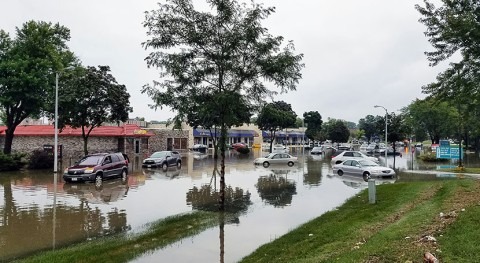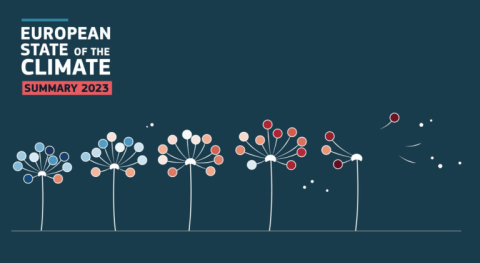As the world warms at a faster rate than at any point in recorded history, human health is on the frontline.
Climate change threatens to reverse decades of progress towards better health and well-being, particularly in the most vulnerable communities. Scientific know-how and resources can help redress the balance, but are not sufficiently accessible or utilized, according to a new multi-agency report coordinated by the World Meteorological Organization (WMO).
WMO’s annual State of Climate Services report this year focuses on health. It highlights the need for tailored climate information and services to support the health sector in the face of more extreme weather and poor air quality, shifting infectious disease patterns and food and water insecurity.
“Practically the whole planet has experienced heatwaves this year. The onset of El Niño in 2023 will greatly increase the likelihood of breaking temperature records further, triggering more extreme heat in many parts of the world and in the ocean – and making the challenge even greater,” says WMO Secretary-General, Prof. Petteri Taalas.
“It is clear that by channelling investment and boosting collaboration, there is huge potential to go further and faster by enhancing the impact of climate science and services so that health partners get the support they need at a time when unprecedented changes to our climate are having an increasing impact,” says Prof. Taalas.
The report, which includes input from more than 30 collaborating partners, features case studies from around the world showcasing how integrated climate and health action makes a very real difference in people’s daily life. This includes early warning systems for extreme heat, pollen monitoring to help allergy sufferers and satellite surveillance for climate-sensitive diseases.
“The climate crisis is a health crisis, driving more severe and unpredictable weather events, fuelling disease outbreaks, and contributing to higher rates of noncommunicable diseases,” said Dr Tedros Adhanom Ghebreyesus, WHO Director-General. "By working together to make high-quality climate services more accessible to the health sector, we can help to protect the health and well-being of people facing the perils of climate change."
Nearly three quarters of National Meteorological and Hydrological Services (NMHS) provide climate data to the health sector, but the uptake is limited. Less than one quarter of Ministries of Health have a health surveillance system that utilizes meteorological information to monitor climate-sensitive health risks.
 Overview of climate services capacities (not sector specific)
Overview of climate services capacities (not sector specific)
Early Warnings for All
The number of medium- or large-scale disaster events is projected to reach 560 a year – or 1.5 each day – by 2030. Countries with limited early warning coverage have disaster mortality that is eight times higher than countries with substantial to comprehensive coverage, according to figures cited in the report.
A special section is devoted to extreme heat, which causes the greatest mortality of all extreme weather. However the impacts are underestimated as heat-related mortality could be 30 times higher than what is currently recorded. Heat warning services are provided to health decision makers in only half of the affected countries, but are expected to rapidly increase by 2027 under the international Early Warnings for All initiative.
Between 2000 and 2019, estimated deaths due to heat were approximately 489,000 per year, with a particularly high burden in Asia (45%) and Europe (36%). Extreme heat conditions during the summer of 2022, were estimated to have claimed over 60,000 excess deaths in 35 European countries.
Heatwaves also exacerbate air pollution, which is already responsible for an estimated 7 million premature deaths every year and is the fourth biggest killer by health risk factor.
Climate change is exacerbating risks of food insecurity. In 2012-2021, 29% more global land area was affected by extreme drought for at least one month per year than in 1951–1960. The compounding impacts of droughts and heatwave days were associated with 98 million additional people reporting moderate to severe food insecurity in 2020 than annually in 1981–2010, in 103 countries analysed, according to figures cited in the report.
The changing climatic conditions are also enhancing the transmission of many climatically sensitive infectious vector-, food-, and water-borne diseases. For example, dengue is the world’s fastest-spreading vector-borne disease, whilst the length of the malaria transmission season has increased in parts of the world.
Some of the most significant challenges to health are in the nexus of water, food security and nutrition, the nexus of infectious diseases (food-, water-, airborne and vector-borne diseases), and the nexus of extreme weather and air quality, particularly in urban areas, says the report.
Key messages
Climate change undermines health determinants and increases pressures on health systems threatening to reverse decades of progress to promote human health and well-being, particularly in the most vulnerable communities.
The Intergovernmental Panel on Climate Change (IPCC) concludes, with very high confidence, that future health risks from injury, disease, and death will increase due to more intense and frequent temperature extremes, cyclones, storms, floods, droughts, and wildfires. It is anticipated that over 50% of the excess mortality resulting from climate change by the year 2050 will occur in Africa.
Health protection is a priority in almost all countries and requires high-quality information to better inform decision-making. Climate information and services are fundamental for better understanding how and when health systems and population health can be impacted by climate extremes and a changing climate, and for managing climate-related risks.
Climate information and services are fundamental for better understanding how and when health systems and population health can be impacted by climate extremes and a changing climate, and for managing risks. Tailored climate products and services can enhance the evidence and information available to health partners to detect, monitor, predict, and manage climate-related health risks.
There is huge potential for enhancing the benefits of climate science and climate services for the health sector and for increasing accessibility, relevance and uptake. Only 31% of NMHSs provide climate services at a ‘full’ or ‘advanced’ level of capacity. A large range of academic, private sector, and government partners are also working to fill the gap, and this needs to be put on a sustainable and coordinated footing.

















